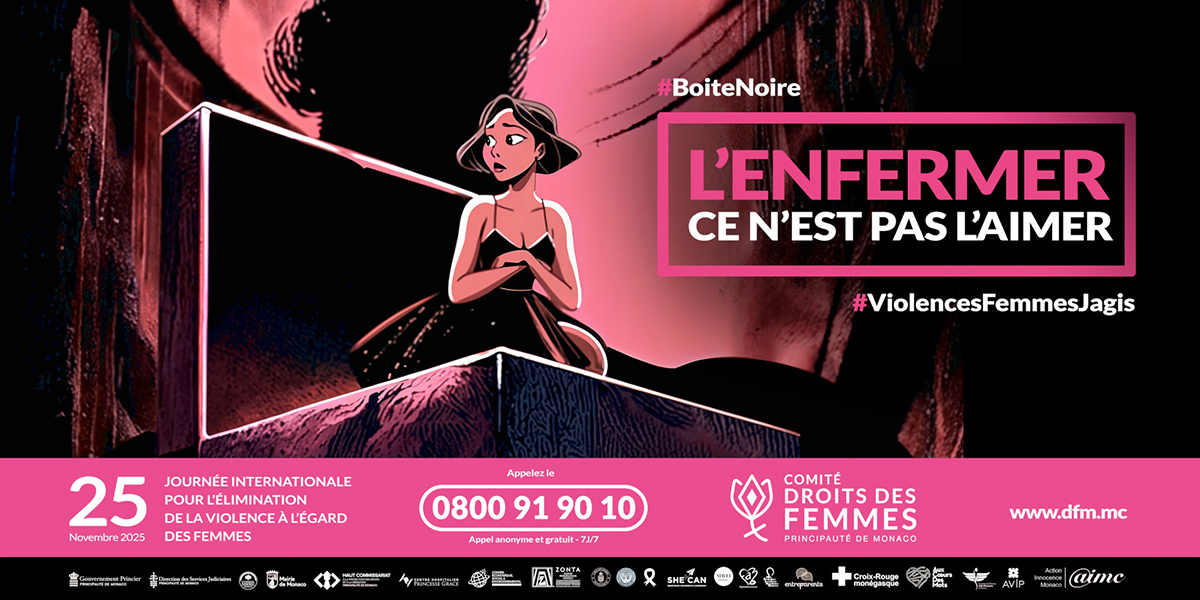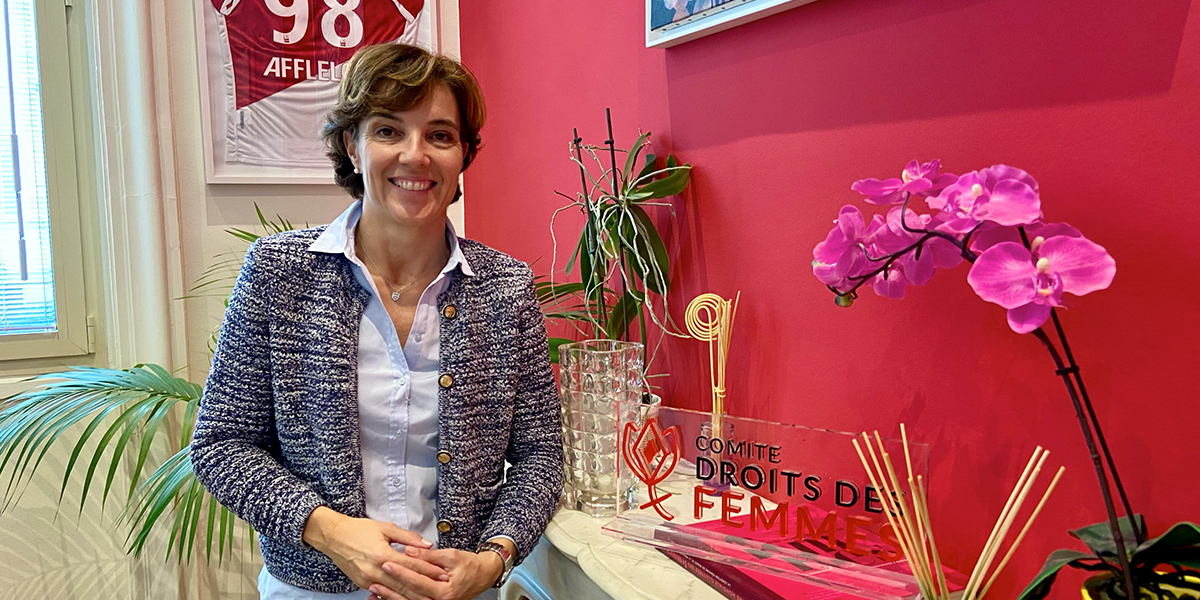Awareness campaigns
Domestic Violence : what support is available for victims?
In Monaco, the Committee to promote and safeguard women’s rights, headed by Céline Cottalorda, is stepping up its efforts: prevention campaigns, training for professionals, local community outreach. These measures are designed to create a safer environment where victims can speak out and feel protected. MonacoSanté keeps you informed.
Coercive control: the invisible mechanics of violence laid bare
It has become an event not to be missed in the Principality every 25th November : the International Day for the Elimination of Violence against Women draws the Committee to Promote and Safeguard Women’s Rights’ attention. Céline Cottalorda, the Women’s Rights Officer, tirelessly continues her prevention and educational work to implement fair public policies that reach their targets: victims of physical and psychological violence. “Our goal is to provide information to the general public and remind them of the support services available in Monaco”, she emphasises. The theme chosen for the 2025 edition focuses on coercive control between intimate partners, from the perspective of the perpetrator of violence. Using a short animated film entitled Boîte noire (Black Box), available in French and English, we decipher the signals that become means of control for the perpetrator of violence over their victim. "This film tells the story of a relationship that begins as a romantic relationship and gradually becomes toxic, with the man controlling the woman. He prevents her from seeing her friends, making phone calls and checks her emails. The story ends very badly, as the process is taken to its logical conclusion." The aim is to show the prison in which both the victim and the perpetrator find themselves.
Providing better support for victims: the power of fieldwork
“We wanted to explain the concept of coercive control, which is not always well understood, unlike that of emotional control. Jealousy taken to a certain extreme is not healthy behaviour. We provide tools to recognise the signs of latent violence that is taking hold, initially psychological, but which very often ends in physical violence." Broadcast on 25 November at the lycée Rainier III (1), this prevention campaign was also accompanied this year by a competition open to young video-making talents on the same theme. Several visuals depicting key moments from the film are on display at the Fontvieille shopping centre. The aim is to encourage victims and those around them to speak out so that the violence can stop. To this end, a free and anonymous helpline is available 7 days a week: 0800 91 90 10. “This is not an emergency number, but a number for help, information and advice on all forms of violence”, explains Céline Cottalorda. Since 2019, professionals (police officers, social workers, associations, school principals, teachers) who come into contact with victims have been attending free training courses organised by the Government and delivered by a former Women’s Rights representative from the Alpes-Maritimes region and a clinical psychologist specialising in domestic violence. Four modules cover topics as varied as welcoming victims, caring for them and sharing experiences between professionals. The last module is devoted to perpetrators of violence. "The general idea behind these training courses is to convey a common culture and create a network of professionals. There needs to be fluid communication between them so that solutions can be found quickly for victims. If people come forward, we need to know how to welcome them, care for them, help them and support them through the legal process, if there are legal issues involved. That's why it's important to have a whole network of professionals, from start to finish".

A unique context in Monaco that requires appropriate responses
As of 1 November 2025, 45 cases of violence had been recorded by the Police Department, compared with 51 cases reported by the Assistance for Victims of Criminal Offences Association. Next comes sexual violence, followed by psychological violence or harassment. 90% of victims are women. The perpetrators are mainly spouses or ex-spouses. “Very often, different forms of violence occur simultaneously. You might experience psychological violence, then physical violence, which can sometimes be sexual, and sometimes economic. It's true that if victims don't speak out, they will remain isolated. We are well aware that there is a grey area in our figures. This is undoubtedly due to the small size of the territory, where everyone knows each other. Social pressure can be very strong", acknowledges Céline Cottalorda. In order to convince victims, special arrangements are offered. At AVIP, for example, a more discreet entrance is available so that victims are not recognised. Another specific feature in Monaco is the prevalence of economic violence. “Victims of this type of violence are often foreign women accompanying their husbands, partners or companions, who have all the financial resources. By moving to another country, the woman finds herself in a situation of economic dependence. She does not necessarily know who to talk to or what her rights are”. The challenge is to reach as many people as possible and to engage with all communities present in Monaco.
Everyday sexism, the deep-rooted cause of violence
Combating everyday sexism is also a priority for the Women’s Rights Officer. “Sexism is always the breeding ground for violence. Once we start thinking that men are better or superior to women, there are no limits. For example, if a father doesn't speak nicely to his wife in front of their children, it instils certain stereotypes in them: they may think that it's okay to speak badly to her, treat her badly, or hit her if she doesn't do what you want. In terms of employment, the gender pay gap is also a factor that is closely monitored”. In terms of employment, the gender pay gap is also a factor that is closely monitored. "We don't treat it as directly related to violence, but it tells us something about society: which areas have the biggest gaps, or the smallest, and how things are changing. Although women are increasingly educated, they remain under-represented in Monaco in the highest-paying sectors and in decision-making positions, such as boards of directors", she says. In an effort to improve the situation, the Committee is turning to the younger generations. Some young people are very aware of everyday sexism, but vigilance remains necessary, particularly in the ‘hyper-violent and hyper-clichéd’ digital space. To raise awareness, the Committee, with the support of the Graduate Integration Commission, has introduced debates aimed at “combating gender stereotypes”. Sowing seeds from an early age to curb the insidious dynamics of violence. For seven years, the work of Céline Cottalorda and all those who support victims of domestic violence in the Principality has encouraged victims to break their silence and escape the vicious cycle of violence. “There's really no shame in speaking out, because it's very difficult to get out of this situation on your own”.
Practical information:
Useful numbers for victims of violence in Monaco
- 0800 91 90 10 / Anonymous and free calls 7 days a week
- Assistance for Victims of Criminal Offences Association (AVIP) - 93 25 00 07
- www.dfm.mc
(1) Lycée Rainier III, Tuesday 25 November at 6.30 pm, Admission is free

